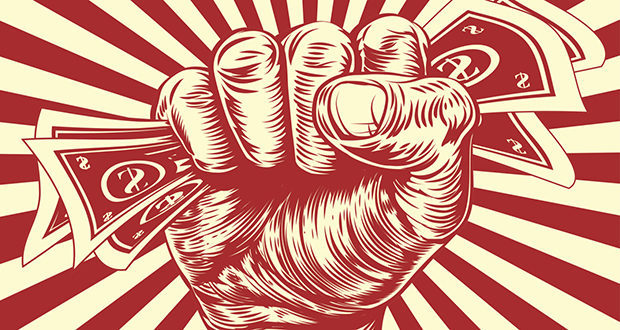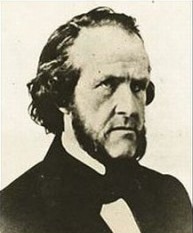A couple tidbits I found interesting this week on the topic of inequality: First, I started reading Walter Scheidel's "The Great Leveler", which is an historical study of inequality from ancient times until today. I mentioned it in a previous post. In the introduction, he gives some interesting, and sobering, facts. First, as I mentioned previously, historically the only events that have significantly shifted inequalities have been world wars, violent revolutions, state collapse and mass deaths as a result of plague. As soon as one of those 'four horsemen' passes, inequality comes back again: "There is no repertoire of benign means of compression that has ever achieved results that are even remotely comparable to those produced by the Four Horsemen."
Next, he points out that the current billionaires in the States make about 1,000,000 times more than the average American, but adds this for perspective:
Then there's this, which JBP tweeted today:
As some of the commenters point out, even Marx agreed that capitalism was better than feudalism. :P There can still be great inequality, but those on the bottom have more than those on the bottom used to have.
And last, I started listening to the audiobook of Murray Rothbard's "The Progressive Era" (The Progressive Era | Murray N. Rothbard), which is an analysis of the late 1800s and early 1900s in the US. Rothbard was an Austrian economist, and the preface gives an idea of what the book is about:
In the first chapters he covers the attempts to cartelize the railroad industry, as well as efforts to monopolize oil, iron and steel, sugar, and agricultural machinery. All these efforts failed, prompting big business to get in league with big government. Rothbard summarizes why they turned to government:
Rockefeller found the same thing with Standard Oil. He was good at buying out his competitors, but it got to the point where people were setting up fake refineries just so Rockefeller would buy them. Standard never got to the point where they could lower production and actually raise prices. And years before the anti-trust dissolution, Standard was losing market share:
Next, he points out that the current billionaires in the States make about 1,000,000 times more than the average American, but adds this for perspective:
So have the rich simply kept getting richer? Not quite. For all the much-maligned rapacity of the "billionaire class" or, more broadly, the "1 percent," American top income shares only very recently caught up with those reached back in 1929, and assets are less heavily concentrated now than they were then. In England on the eve of the First World War, the richest tenth of households held a staggering 92 percent of all private wealth, crowding out pretty much everybody else; today their share is a little more than half. High inequality has an extremely long pedigree. Two thousand years ago, the largest Roman private fortunes equaled about 1.5 million times the average annual per capita income in the empire, roughly the same ration as for Bill Gates and the average American today. For all we can tell, even the overall degree of Roman income inequality was not very different from that in the United States.
Then there's this, which JBP tweeted today:
As some of the commenters point out, even Marx agreed that capitalism was better than feudalism. :P There can still be great inequality, but those on the bottom have more than those on the bottom used to have.
And last, I started listening to the audiobook of Murray Rothbard's "The Progressive Era" (The Progressive Era | Murray N. Rothbard), which is an analysis of the late 1800s and early 1900s in the US. Rothbard was an Austrian economist, and the preface gives an idea of what the book is about:
The aim of this proposed book is to trace the origins of the current welfare-warfare state in America, in what is loosely called “The Progressive Period,” from approximately the mid-1890s to the mid-1920s. Briefly, the thesis is that the rapid upsurge of statism in this period was propelled by a coalition of two broad groups: (a) certain big business groups, anxious to replace a roughly laissez-faire economy by a new form of mercantilism, cartelized and controlled and subsidized by a strong government under their influence and control; and (b) newly burgeoning groups of intellectuals, technocrats, and professionals: economists, writers, engineers, planners, physicians, etc., anxious for power and lucrative employment at the hands of the State. Since America had been born in an antimonopoly tradition, it became important to put over the new system of cartelization as a “progressive” curbing of big business by a humanitarian government; intellectuals were relied on for this selling job. These two groups were inspired by Bismarck’s creation of a monopolized welfare-warfare state in Prussia and Germany.
The big government created by this business-intellectual partnership had important repercussions for all aspects of American life, in addition to the cartelized and regulated economy. For one thing, the drive of pietists and compulsory “moralists” could now be foisted on the American public in the name of the newly burgeoning medical “science.” The result: Prohibition, antisex laws, antidrug laws, and Sunday blue laws. Another result, which made heavy and effective use of the “morality” theme, was the business-professional drive to centralize and take over the nation’s cities, thereby reaping good government as against the wicked and corrupt old urban machines — which were responsive to poorer and immigrant groups. One of the major aspects of this urban centralization was to centralize the public school system, and force children into them, so that the immigrant Catholic groups would be “Christianized” and be inculcated in the values of the American State and the new system.
In foreign affairs, the new partnership of government and business meant a substitution of a new American imperialism for the older roughly “isolationist” and neutralist foreign policy. The U.S. government was now supposed to open up markets for American exports abroad, use coercion to protect American investors and bondholders overseas, and seize territory on behalf of these aims. It was to be willing to go to war on behalf of these aims. The increasing militarism also meant heavy government contracts and subsidies for favored arms manufacturers.
A third group, virtually created by the new system as a junior partner, was labor unions, which were weak until they were called to share the ruling power of the “collectivist planning” of World War I. Creating favored unions was an instrument of cartelization, as well as insuring worker cooperation in the new order. Partly to mold the immigrants more easily, and partly as a boon to labor unions, immigration was virtually abolished during and after World War I, fueled by the racism sponsored by American social scientists.
Thus, from a roughly free and laissez-faire society of the 19th century, when the economy was free, taxes were low, persons were free in their daily lives, and the government was noninterventionist at home and abroad, the new coalition managed in a short time to transform America into a welfare-warfare imperial State, where people’s daily lives were controlled and regulated to a massive degree. In this way, the coalition, inspired by Bismarck’s example and its success in World War I, was able to reach its apogee in Europe, in Mussolini’s “corporate state” and derivative political regimes. In the United States, its apogee was reached in Roosevelt’s New Deal and post-World War II America. ...
In the first chapters he covers the attempts to cartelize the railroad industry, as well as efforts to monopolize oil, iron and steel, sugar, and agricultural machinery. All these efforts failed, prompting big business to get in league with big government. Rothbard summarizes why they turned to government:
A typical example of the rapid rise and fall of the trust, peaking during the great merger wave of 1897–1901, was the National Biscuit Company. It was formed in 1898 as a great combination of three previous regional combinations, designed to monopolize the biscuit market, to purchase competitors, and to control competition by restricting production and raising prices. The result was disaster, as the National Biscuit Company admitted in a remarkable confession in its Annual Report for 1901. Announcing a complete change of policy from its previous aim of controlling competition, the Annual Report declared:
When we look back over the four years [since National Biscuit Company was founded], we find that a radical change has been wrought in our methods of business. ... [W]hen this company started, it was thought that we must control competition, and that to do this we must either fight competition or buy it. The first meant a ruinous war of prices, and a greater loss of profit; the second, a constantly increasing capitalization. Experience soon proved to us that, instead of bringing success, either of these courses, if persevered, must bring disaster. This led us to reflect whether it was necessary to control competition ... we soon satisfied ourselves that within the Company itself we must look for success.
We turned our attention and bent our energies to improving the internal management of our business, to getting full benefit from purchasing our raw materials in large quantities, to economizing the expenses of manufacture, to systematizing and rendering more effective our selling department; and above all things and before all things to improve the quality of our goods and the condition in which they should reach the customer.
It became the settled policy of this Company to buy out no competition ...
By the turn of the 20th century, in fact, businessmen had become disillusioned with trust combinations. In trust after trust, higher prices brought about by the combine simply attracted new and powerful competitors — and this after the trust had expended a great deal of resources in buying out previous competition.
Rockefeller found the same thing with Standard Oil. He was good at buying out his competitors, but it got to the point where people were setting up fake refineries just so Rockefeller would buy them. Standard never got to the point where they could lower production and actually raise prices. And years before the anti-trust dissolution, Standard was losing market share:
Specifically, Standard made two grave mistakes because of its deficient entrepreneurial skills after 1900. It failed to grasp the crude oil revolution, namely that more and more crude was being discovered in the Texas, Gulf, and California areas. Rooted completely in the Pennsylvania-Ohio oil fields, Standard only grasped the significance of the new oil discoveries late in the day. As a result, new firms such as Texas Company and Gulf Oil were able to stead a march on Standard. Secondly, Standard was the last major firm to realize that gasoline was replacing kerosene as the major petroleum product, a mighty shift occasioned by the two great technological industrial revolutions of the first decades of the 20th century: the shift from kerosene to electricity in providing light, and the growth of the automobile as the major means of land transportation. As a result, in 1899, 63% of total oil refined was kerosene; 20 years later, however, the percentage was only 15%.
Moreover, new independent refiners were attracted to the petroleum industry by Standard’s high profit margins. Whereas there was a total of 67 refiners in 1899, they had more than doubled to 147 by 1911. The independents, furthermore, led Standard in various innovations in petroleum: in the concept of retail gas stations; in the discovery and production of petrochemicals; in tank cars and tank trucks for conveying oil.





